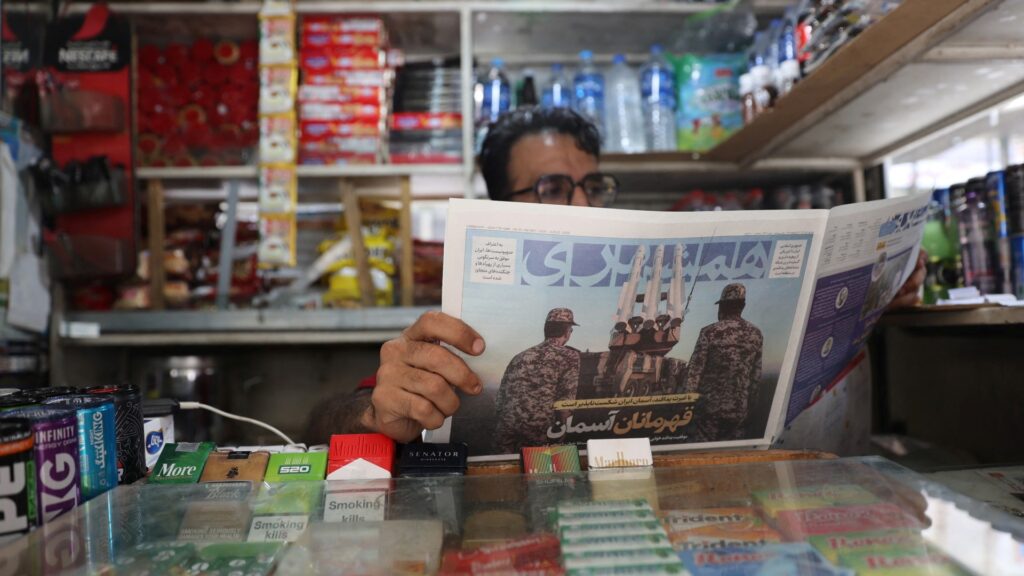Just before Sarah went to sleep on Saturday night, her husband turned to her and said: “I hope there’s peace when we wake up tomorrow.”
Instead, when she woke at 5am to get a glass of water, she discovered that the United States had attacked Iran.
The 36-year-old Tehran resident says their dream of peace – which to many Iranians like Sarah means an end to Israeli attacks and a rapprochement with the West – now feels even further away.
US President Donald Trump announced on Truth Social, his own social media platform, that Washington had bombed three Iranian nuclear facilities: Fordow, Nantaz and Isfahan.
He declared that Tehran should now seek peace, despite spurning negotiations for joining Israel in attacking Iran.
New MEE newsletter: Jerusalem Dispatch
Sign up to get the latest insights and analysis on
Israel-Palestine, alongside Turkey Unpacked and other MEE newsletters
“He attacks us, then says we should make peace? It reminds me of school bullies who’d pick a fight and then, after landing the last punch, would say the fight is over,” says Davood, 58. Like all the Iranians interviewed by Middle East Eye, Davood preferred to use only his first name for security reasons.
Hostilities began on 13 June when Israeli attacks rained down on Iran in an unprovoked offensive that has killed at least 430 people, including several senior officials and military commanders, and destroyed much infrastructure.
In response, Iran has fired ballistic missiles that have penetrated Israeli air defences and caused large damage and killed at least 25 people.
Israeli Prime Minister Benjamin Netanyahu has claimed the attacks are aimed at diminishing Iran’s capability of creating a nuclear weapon.
US attacks Iran: What are the Islamic Republic’s options?
Read More »
Iran is a signatory of the Non-Proliferation Treaty, says it has no interest in building a nuclear bomb and was engaged in negotiations with the US over the issues at the time. Israel, meanwhile, has an undeclared nuclear arsenal.
There had been growing speculation in recent days that further and larger strikes would hit Iranian nuclear facilities – especially Fordow, which is buried deep underground.
However, military experts had said only US bunker-busting bombs could destroy the facility, and that Israel doesn’t have that capability. As a result, many Iranians were worried an American attack might be coming soon.
Milad, 35, was one of them. He lives in the northwestern city of Mashhad, 900km from Tehran, and works as a computer engineer.
“They have the power and they use it against us,” he says.
“But I think if we give in now, it’ll only get worse. We need to strike back, firmly, at American bases in the region. Otherwise, Trump will just keep boasting: ‘See? I did what no other US president could’,” he adds.
“The other issue is that if we don’t respond, Israel will feel free to attack Iran whenever it wants. We must retaliate, even if Trump threatens a stronger response.”
‘Caught between a devil, a monster and a wildcat’
Not everyone in Iran agrees with Milad.
Many Iranians are already unhappy with the Islamic Republic, and fear that retaliation could lead to even more destruction.
Negin, 44, is a psychologist living in Tehran. “Even if we launch a stronger counterattack, then what?” she asks.
According to the US military, 125 warplanes were used in the operation, 14 30,000-pound massive ordinance penetrator bombs were dropped on nuclear sites and B2 bombers and a nuclear submarine were involved.
“They’re more powerful, and the world has lost all sense of honour and humanity. They’ll strike back even harder and make life worse for the Iranian people. And in the end, western countries will say, ‘Trump did the dirty work for us. Now the world is a safer place’,” Negrin says.
“The world is cruel. Just like it stayed silent about the crimes in Gaza and Lebanon, it will stay silent about Iran too.”
Iranians’ wish to end hostilities but also respond to the attack reveals the confused state of Iran and public opinion. Many are distressed and unsure of what to do next.
Saeed, a chemical engineering graduate from Kermanshah in western Iran, says: “We’re caught between a devil, a monster and a wildcat”, by which he says he means “the Islamic Republic, Trump and Netanyahu”.
“And in between, it’s our lives – the ordinary people – that are being destroyed. We hate the government here for letting things get to this point, but Netanyahu and Trump are the most wicked people I’ve ever seen,” he tells MEE.
“Just a few days ago, Trump said he’d decide on attacking Iran in two weeks. And now, once again, he’s shown why more people around the world hate the US government every day. All they do is lie.”
So far, there hasn’t been a clear official response from Tehran, but Islamic Republic officials have stated that Iran has the right to respond.
No one knows what kind of response it will be.
When Qassem Soleimani, a key Revolutionary Guard general, was killed in a US strike in Baghdad January 2020, Iran responded with a previously telegraphed missile barrage on a US military base in Iraq. That response was considered measured.
But in recent days, threats of retaliation have grown.
On Wednesday, Iran’s Supreme Leader Ali Khamenei warned: “The Americans must know that any military intrusion will without a doubt result in irreparable damage.”


